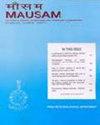从太空探索 2019 年季风季节印度西部一个邦的极端洪水事件
IF 0.7
4区 地球科学
Q4 METEOROLOGY & ATMOSPHERIC SCIENCES
引用次数: 0
摘要
马哈拉施特拉邦在 2019 年季风季节的 7 月和 9 月经历了一系列灾难性洪水事件,数百万人受到影响。孟买、Palghar、Thane、Raigad、Satara、Sangli、Pune 和 Kolhapaur 是马哈拉施特拉邦受灾最严重的地区。本研究利用近实时空间卫星观测来监测这些事件。降雨模型综合了多光谱卫星传感器的观测数据,可提供 5 千米(半小时)极高分辨率的精确降水信息,为有效监测洪水事件提供了绝佳机会。通过调查 2013 年凯达纳特、2014 年查谟和克什米尔以及 2015 年泰米尔纳德邦的洪水事件,测试了该模型的实用性。该模型还被用于研究 2019 年喀拉拉邦和阿萨姆邦最近发生的洪水事件。 孟买、帕尔格尔、塔内、雷加德、萨塔拉、桑利、浦那和科尔哈帕尔地区在 7 月的第一周、第三周和最后一周以及 9 月的第二周和最后一周多次降雨,导致这些地区发生严重洪灾。结果显示,在 7 月至 9 月期间的多次暴雨中,其中几个地区的累计降雨量超过了 2000 毫米。孟买、帕尔格尔、塔内和雷加德在 7 月至 9 月期间的累计降雨量超过 1700 毫米。桑加利地区在 2019 年 7 月期间的降雨量超过月平均降雨量约 200%。多次降雨造成的累计降雨量大,导致马哈拉施特拉邦多个地区发生严重洪灾。本研究报告的结果凸显了减轻和适应洪水灾害战略的重要性。本文章由计算机程序翻译,如有差异,请以英文原文为准。
Exploring extreme flood events of a western state of India during monsoon season of 2019 from space
Maharashtra experienced a series of calamitous flood events during July and September months of monsoon season of 2019 affecting millions of people. Mumbai, Palghar, Thane, Raigad, Satara, Sangli, Pune and Kolhapaur were most affected districts of Maharashtra. Near real time satellite observations from space have been used in this study to monitor these events. Availability of accurate precipitation information at very fine resolution of 5 km (half hourly) from a rainfall model that integrates observations from multi-spectral satellite sensors offers an excellent opportunity to monitor flood events effectively. Utility of this model was tested by investigating flood events of Kedarnath in 2013, Jammu and Kashmir in 2014 and Tamil Nadu in 2015. This model was also used to explore recent flood events of Kerala and Assam in 2019. Mumbai, Palghar, Thane, Raigad, Satara, Sangli, Pune and Kolhapaur districts received very heavy rainfall from multiple rain episodes during first, third and last week of July, and second and last week of September that resulted in heavy flooding over these districts. Results reveal that few of these districts received cumulative rainfall in excess of 2000 mm from multiple heavy rainy events during July to September. Mumbai, Palghar, Thane and Raigad received a cumulative rainfall in excess of 1700 mm during July and September. Sangali district received an excess of about 200% rainfall than average monthly rain during July 2019. Heavy cumulative rainfall from multiple rain spells resulted in heavy flooding over various districts of Maharashtra. Results reported in this study highlight the importance of mitigation and adaptation strategies against flood disasters.
求助全文
通过发布文献求助,成功后即可免费获取论文全文。
去求助
来源期刊

MAUSAM
地学-气象与大气科学
CiteScore
1.20
自引率
0.00%
发文量
1298
审稿时长
6-12 weeks
期刊介绍:
MAUSAM (Formerly Indian Journal of Meteorology, Hydrology & Geophysics), established in January 1950, is the quarterly research
journal brought out by the India Meteorological Department (IMD). MAUSAM is a medium for publication of original scientific
research work. MAUSAM is a premier scientific research journal published in this part of the world in the fields of Meteorology,
Hydrology & Geophysics. The four issues appear in January, April, July & October.
 求助内容:
求助内容: 应助结果提醒方式:
应助结果提醒方式:


